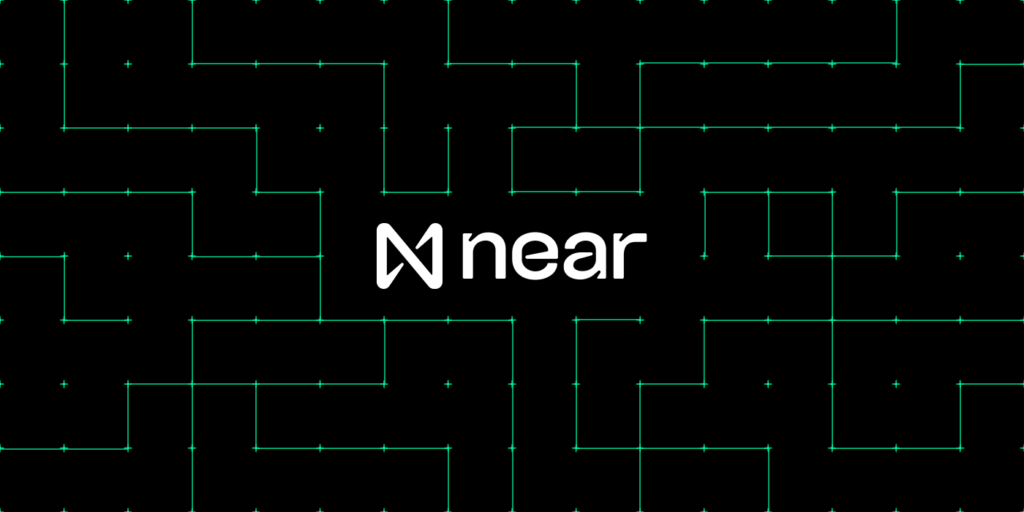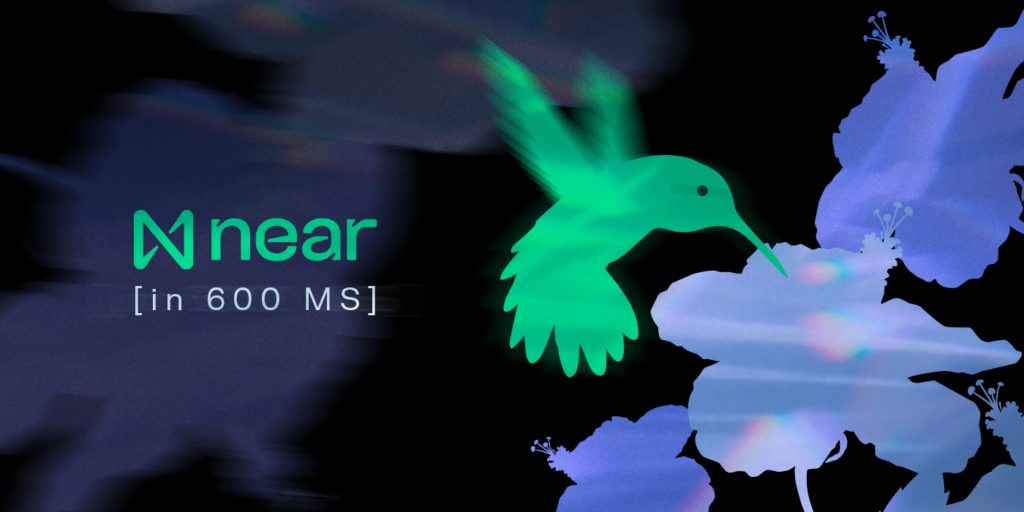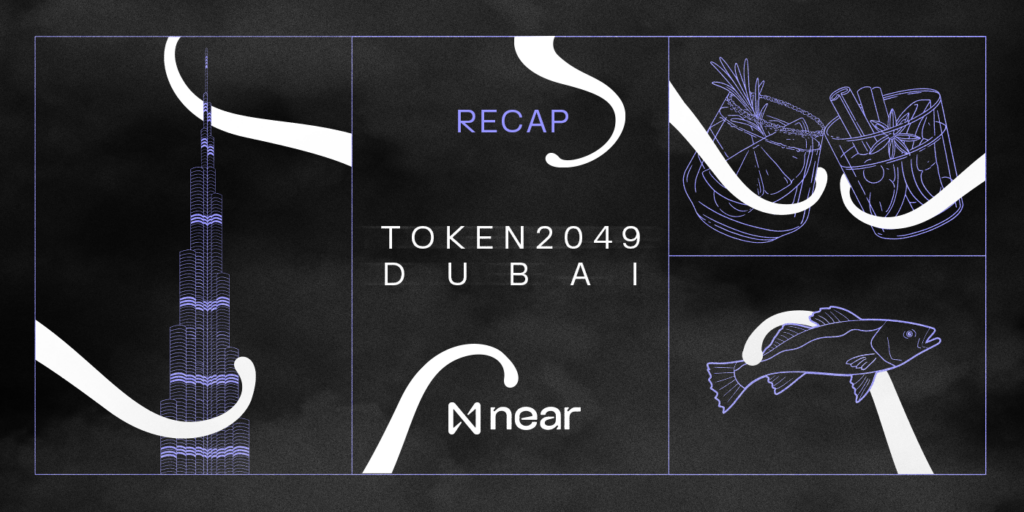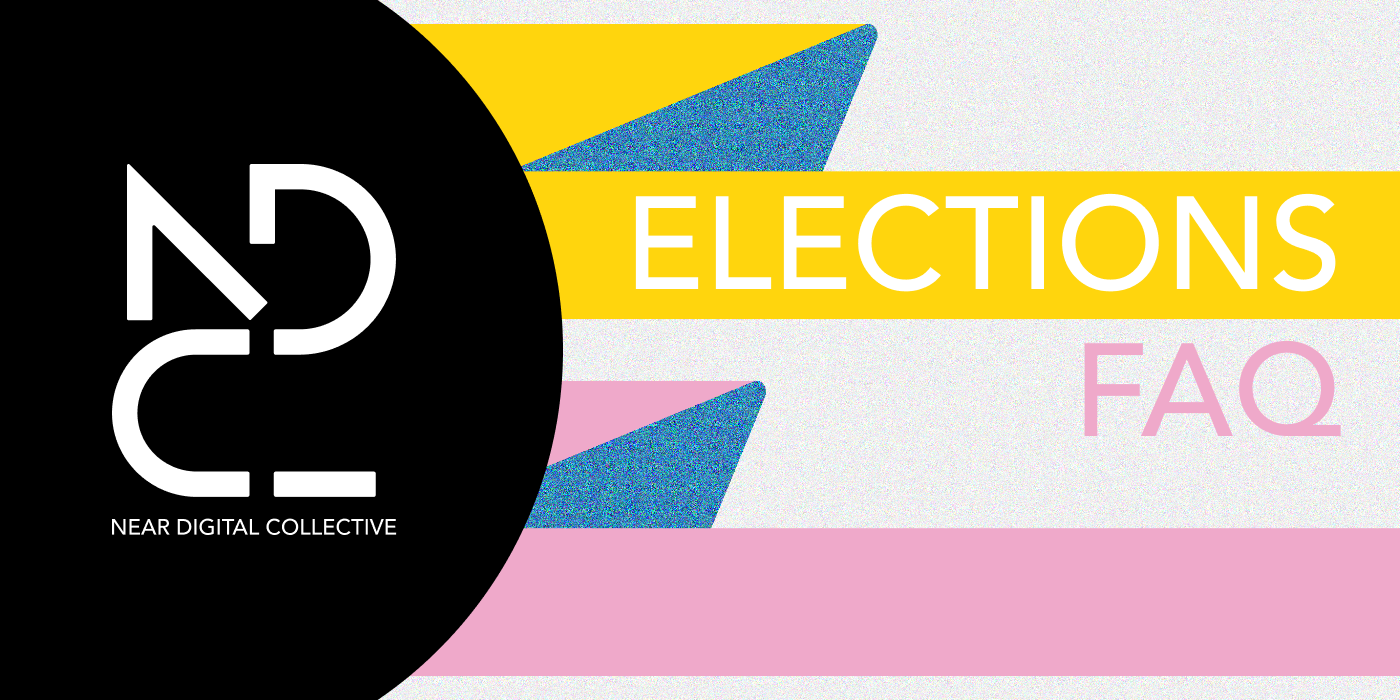NDC V1 Governance Elections FAQ
The NEAR Digital Collective (NDC), the largest decentralization effort on any layer 1 blockchain, has spent much of 2023 designing a number of frameworks that will allow any member of the NEAR Protocol network to have a say in how NEAR is run. NDC’s goal is to combine transparency, collective decision making, evolving governance models, and self-determination in a completely new way.
After laying this decentralization groundwork, the NDC is gearing up for its first elections. As of July 19th at 15:00 pm UTC: I-AM-HUMAN OG SBT Soul Bound Tokens holders can now nominate themselves for office. This is your opportunity to upvote and to comment on candidates you believe in and who could add the most value to the future of NEAR!
What are the key dates to remember for the NDC election?
- July 19, 15:00:00 UTC — Start date for candidacy submissions on BOS and get I-AM-HUMAN SBT
- September 1, 23:59:59 UTC — Deadline for Voter Registration via I-AM-HUMAN
- September 1, 23:59:59 UTC — Deadline for applying for an OG Badge for candidacy eligibility
- September 7, 23:59:59 UTC — Deadline for candidacy submissions
- September 8, 00:00:00 UTC — Voting begins at Near APAC in Vietnam
- September 22, 23:59:59 UTC — Voting ends
Below you will find a list of frequently asked questions about the elections, from how participation and voting works to candidate selection, election integrity, and more.
NDC V1 Governance Structure
NDC V1 Governance includes three elected houses, a voting body, and a community treasury. The qualification to run for V1 governance requires an OG SBT. Elected Community members (OG’s) of each house are responsible for planning, overseeing, and allocating funding aligned with the ecosystems Northstar to grow and decentralize NEAR.
What will the NDC government look like?
The NDC government will be composed of three houses, structured as following:
| Name of the House | House of Merit (HoM) | Council of Advisors (CoA) | Transparency Commission (TC) |
|---|---|---|---|
| Seats | 15 seats | 7 seats | 7 seats |
| Responsibilities | In charge of allocating the treasury and deploying capital for the growth of the ecosystem. | In charge of vetoing proposals from the HoM and guiding the deployment of the treasury. | In charge of keeping behavior of elected officials clean, and making sure cartels do not form in the ecosystem. |
| Commitment | 5-20 hours weekly with a minimum participation threshold. | 5-20 hours weekly with a minimum participation threshold. | 5-20 hours weekly with a minimum participation threshold. |
| Expertise Required | Budgetary expertise for ecosystem-wide budget planning, treasury management, and review. | Strategic minds to advise the House of Merit and hold budget veto power. | Unbiased guardians of the treasury that investigate and remove bad actors. |
Nominate Yourself for Candidacy
Who can run for office?
In order to run for office, you must hold an OG SBT. These aren’t given out to just anyone; these are for people that have been actively contributing to the NEAR ecosystem for extended periods of time. If you already have an OG SBT, you can self-nominate yourself right now.
To find out the full criteria and to see if you qualify, please refer to Safeguards and OG. If you still require help, head over to the official NDC Telegram and ask a member of the team for help.
Why should you run for office?
If you’re an OG, we need your expertise and authentic commitment to the continued growth, success, and most importantly… Decentralization of NEAR. This is an opportunity for you to actualize an incredible future for NEAR.
What information will be available in the candidate profiles?
The candidate profiles are on BOS Nomination and will contain their name, background, affiliation, and policy positions. The profiles should give you a clear overview of what to expect should you select them as your preferred candidate. You can choose to upvote the candidate and comment on the candidate profiles as long as you are registered through I-AM-HUMAN.
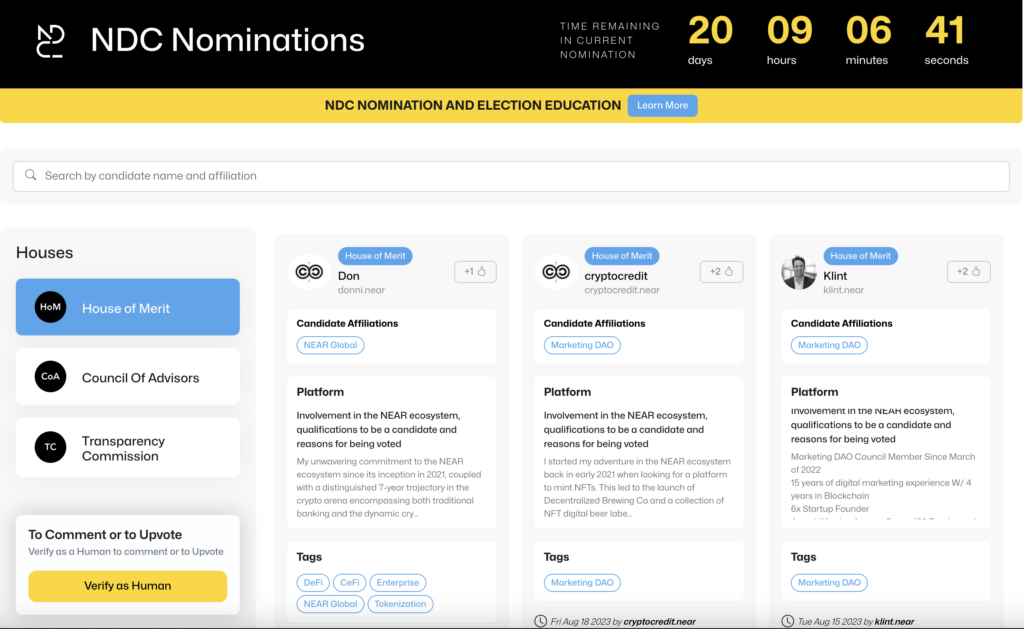
Election Overview
Nomination starts the NDC v1 governance process and runs for 50 days and allow the community to rally their candidates. The nomination ends on September 7, and the election starts on September 8 and runs for two weeks. The elected representatives are onboarded for one week, and begin to organize the first government for the NEAR ecosystem.
Nomination Period: July 19th to September 7th, 2023
Election Period: September 8th – September 22nd, 2023
Start of 1st Congress: October 1st – April 1st, 2024
How can my vote shape the future of the NEAR ecosystem?
By engaging in the election process, you get to help determine the direction of the NDC and the future of decentralization on NEAR. This is not like a presidential election where your vote is a thimble of water added to a sea. Every vote in the NDC election actually makes a difference, and some of the elected positions will likely come down to just a few votes. When the candidates have very different policy positions, each vote has a potentially outsize impact.
How else does my vote matter?
By participating in the elections process and on-chain voting, you are also contributing to your own on-chain reputation.
Participation
How can I participate in the NDC election?
The main ways to participate in the NDC election are of course voting for candidates or running as a candidate, but there’s a lot more to it than just that. Through our Nominations platform, voters and candidates will be able to engage with one another discussing policy positions and contribute to candidacy social proof through commenting or upvoting.
What is the eligibility criteria to vote?
Any person with a Face Verified Soul Bound Token (SBT) is eligible to vote, and anyone can get one with a NEAR wallet through I-AM-HUMAN.
What is the eligibility to run in the NDC election?
In order to be eligible to run in the NDC election, candidates will need to be one or more of the following:
- A Champion of the NDC that is still actively contributing to the ecosystem. Champions are ecosystem leaders that run nodes or projects and contribute to a workgroup or initiative they feel passionate about to help bring NDC V1 Gov online. They contribute by lending time or resources and also help by referring or recruiting contributors to help deliver objectives.
- An NDC Contributor that forfeited or received a bounty through June ’23 that is still actively contributing to the ecosystem.
- A member of NEAR Inc or NEAR Foundation before the Pagoda rebrand in Feb ’22 that is still actively contributing to the ecosystem.
- A member of VCs, nodes, projects, or spinout founders in the ecosystem before the Pagoda rebrand in Feb ’22 that is still actively contributing to the ecosystem (including, but not limited to, Aurora, NEAR UA, Proximity Labs, Lyrik(MOVE) Capital, NEAR Balkans, MetaWeb, MetaPool, Orderly, NEAR Vietnam, Satori, Open Shard Alliance, Open Forest Protocol, Human Guild, HAPI Labs, Calimero, OnMachina, Ref, PemBrock, etc.).
- A known OG and Community member for at least one year that is still actively contributing to the ecosystem.
Remember: bids for candidacy can be turned in as soon as July 19 and no later than September 7th. Give yourself ample time to fill out a form detailing your background, experience, and what you plan to bring to NDC governance. This material you provide helps the NEAR community make an informed decision about your candidacy.
Election Integrity
What procedures will be in place to ensure election integrity?
We would love to see every single person in the NEAR ecosystem vote in NDC elections, but in order to maintain election integrity, there is one important requirement in order to cast a valid ballot. You will need to have a Face-Verified Soul Bound Token (SBT) linked with a NEAR wallet. You may use your main wallet or create a new one explicitly for the purpose of voting.
Does Face Verification mean you have a picture of my face connected to my wallet?
No. I-AM-HUMAN does not store your biometrics. You are also free to request the deletion of any and all data collected in this process should you decide to forfeit your FV SBT.
Will there be any election oversight?
It goes without saying that we want as fair and transparent an election as possible. Given that we are remote, and that the internet can be a strange place, there have been certain safeguards implemented into all NDC elections, that deter poor behavior, and also guarantee that bad actors are punished if they are able to manipulate an election. Election integrity can ultimately be broken down into six clear safeguards:
Safeguard 1. Fair Voting Policy (voters agreement to not sell votes). On behalf of all voters, holding an I-Am-Human verified account, you agree when you vote, that you will not sell your vote. If it turns out that you do sell your vote, you are eligible to post-election enforcement from the TC (see safeguard 6).
Safeguard 2. Candidate Agreement to Transparency and Accountability to not buy votes. On the candidates’ side, they all also agree to not buy votes for their election, and are equally eligible for post-election enforcement if they are found guilty.
Safeguard 3. Implementing a Vote Bonding: Vote bonding is a mechanism designed to deter malicious voting behaviors. Participants must stake a certain amount of NEAR tokens, as a bond to vote. This bond ensures good faith participation and can be reclaimed post-voting if all rules are adhered to. However, if participants engage in vote manipulation, such as buying or selling votes, the bond is forfeited. This mechanism introduces a strong financial disincentive to engage in fraudulent activities, safeguarding the integrity of the voting process. Recently, in a NDC produced EasyPoll, the community had a majority vote to have a bond for the vote.
Safeguard 4. Pikes Peak review Election results ongoing/after. NEAR is fortunate enough to have the data visualization and tracking capabilities of Pikespeak, active and involved in the ecosystem. As a core supporter of NDC, Pikes Peak is also going to be monitoring election results both during and after the election to identify any anomalies and ensure it is done as fairly as possible.
Safeguard 5. Whistleblower program and bounty. In addition to the technical safeguards and Pikespeak oversight, the NDC is also instituting a whistleblower incentive program whereby anyone who has knowledge of potential election fraud can receive a bounty assuming their claims as to people and impact are justified and accurate.
Safeguard 6. Enforcement by Transparency Commission. In the event of any serious election fraud the investigation, and decision to remove, or forever ban either a voter or a candidate, will lie with the Transparency Commission. This means that there is ultimately no escape for a wrongdoer once they have been discovered or accused. The official Transparency Commission process is to field a complaint, investigate the complaint, and then publicly move to either remove, or ban the member in question from further participation.
With these six safeguards, we are hopeful that all elections for the V1 framework will be fair and transparent.
Is NEAR Foundation or any other organization external to NDC involved?
No. The NDC community is the sole administrator of this election, though NDC funding originated at NEAR Foundation.
Voting
Voting powered by I-Am-Human proof of personhood soul-bound tokens (SBTs). 1 Human, 1 Vote kickstarts voting. future versions factor in activity throughout the NEAR Ecosystem, giving merit based on contribution and reputation.
What date does voting start for the NDC General Election?
The NDC Election starts on September 8, 00:00:00 UTC, which coincides with NEAR APAC in Vietnam.
How can I vote in the NDC election?
Voting in the NDC election is designed to be as simple as possible and will take place on NEAR’s Blockchain Operating System. A link to voting will be found on the NDC’s Medium, Telegram, and Discord. You’ll simply log in, review candidate profiles and their platforms, and submit your choices. Be sure to vote within the designated time frame to be sure your voice is counted.
What should I consider before voting for a candidate?
Just like in any civic election, you should familiarize yourself with the policy positions of the candidates as well as their backgrounds. All candidates will have been vetted and have an “OG SBT,” but will likely have widely divergent views on the direction of the NDC. Asking questions and commenting on their platforms can also be a valuable way to get clarity on any positions that seem unclear to you.
Can I change my vote once I’ve submitted it?
Since all votes are recorded on the blockchain, they are immutable and cannot be changed after submission. Therefore it is in your best interest to triple check your selections before hitting that “submit” button.
Information & Support
Where can I find the most accurate and up-to-date information about the NDC election?
You can find the most accurate and up-to-date information on the NDC’s Medium, Telegram, and Discord.
Where can I get support if I have any issues or questions during the election process?
You are welcome to reach out for support on Telegram or Discord.
Post-Election
How will the election results be announced?
Election results will be announced on the NDC’s Medium, Telegram, and Discord and will also be viewable in the Election UI. Winning candidates will be highlighted in green.
What happens after the election results are announced?
After the election results are announced, the elected representatives will convene for the first time in the first NDC governance town hall, where we will hear from elected members from the three branches of NDC governance.
Share this:
Join the community:
Follow NEAR:
More posts from our blog
